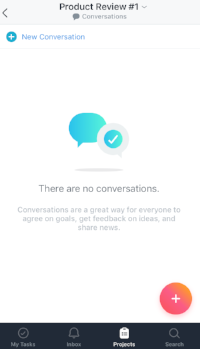What Is Asana
Founded in 2008 and launched publicly in 2011, Asana is a website and mobile application that gives users a single medium to create, view, and collaborate on tasks and projects. Asana allows users to designate tasks to team members, provide real-time status updates, create a timelines or calendars for project goals, and form group chats for messaging team members. Asana offers a multitude of integrated software and applications, including Salesforce, Slack, Dropbox, Google Drive, Evernote, Gmail, and Microsoft Office 365, which allow users to upload and share project-related documents, pictures, videos, spreadsheet all in one place. For arts managers it may be a useful tool for managing unique teams, be they in house or remote, and for streamlining project communications.
A detailed breakdown of all the features of Asana can be viewed here. In this review we will focus on comparing the user experience of managing projects on Asana’s web platform vs. their mobile platform. The web and mobile applications are compatible among users, and any project updates that occur on either platform update and sync immediately, however there are slight variations in the two platforms.
Website
In general, the website and mobile application carry out the same basic functions. Users can easily create tasks, large projects, calendars, and group messages. However, the overall layout on the website is starkly different compared to the phone application. For those who wish to use Asana on both platforms, it is important to note that some features are expanded in the website format. For example, the website provides an extensive drop-down menu for projects that are not found on the app. Website users can add tags to projects, delegate a person that the project is “dependent” upon, and print a task list.
Additionally, the website provides an important feature that is currently lacking on the app: the ability to publish the status of a task within a larger project. The status is indicated by “On Track,” “At Risk,” and “Off Track”. Such updates are crucial for project managers, especially those responsible for multiple groups at a time.
Mobile App
The Asana mobile app is configured in a relatively intuitive way. Even those who are not as well-versed with technological applications will find the app quite easy to navigate for the most part.
You can use the app to create a simple list of personal tasks, similar to any form of basic to-do lists. However, Asana allows the user to add extra layers of personalization to each task, such as adding a description, due date, and applicable files.
If using Asana to carry out a group project or goal, the app provides easy access to communicate with other members assigned to the project. The communication is instant and attached to a respective project, therefore users may find that this is a more efficient method of project management than e-mail chains.
When creating a project, Asana provides users with many options to organize people and subsequent tasks or deadlines.
For those who want to exert the least amount of effort in viewing or completing projects, simply holding a finger on the app (without actually opening it) will produce a shortcut menu to add a new task, see messages, or do a general search. The Asana app gives users the tools to view and understand their personal goals in a short time frame.
Pricing
Asana is free to all users in both the website and mobile formats. However, the free version of Asana only allows users to create project teams of up to 15 people. This is a reasonable option for individual users or for small-scale collaborations, considering the free version provides an unlimited number of projects, tasks, group chats.
If users or organizations want to upgrade, there is a Premium version and an Enterprise Version. The Premium version, which costs $9.99 per month, is for individual users who want to use Asana with some additional features. This version allows for an unlimited number of team members, the ability to create timelines, advanced project searches to track progress, admin controls, and private projects or tasks within an organization.
The price of Asana Enterprise is not publicly available. Large organizations who are interested in utilizing this version must contact Asana directly for a price quote. Enterprise offers the most complex capabilities for users. There are options for data and privacy controls, so that organizations can secure and back-up confidential project details. An organization can also personalize the website and application with its logo to maintain cohesion across internal project management platforms. Another convenient feature of Asana Enterprise is the ability to export any of the project information and documents as a single file.
Conclusion
Despite the user-friendly nature of Asana, the noted program quirks and platform inconsistencies that are worth considering when evaluating a project management solution for your organization. However, you may find the benefits for long-term use of Asana worthwhile, especially in scenarios involving individuals responsible for balancing numerous projects with individuals in various locations.
Pros:
- User-friendly
- 2 platforms to choose from
- Instant communication among team members
- Convenient integrations
Cons:
- Inconsistent features between website and mobile app
- Some of the most useful features not available on free version
For more project management tools check out:
Take Our Quiz: The Best Project Management Tool For You and Your Team
Coordinating decentralized teams, clients, and projects with Basecamp
Can Cloud-Based Event Management Software Help Arts Managers Be “Propared?”
When Post-Its Won’t Do, Try Trello
Sources:
“Asana: The easiest way to manage team projects and tasks”. Asana. Accessed September 25, 2018. https://asana.com/product.
Finnegan, Matthew. “What is Asana? Task management tracking made easy”. ComputerWorld. Last updated November 2, 2017. Accessed September 25, 2018. https://www.computerworld.com/article/3235710/collaboration/what-is-asana-task-management-tracking-made-easy.html.






